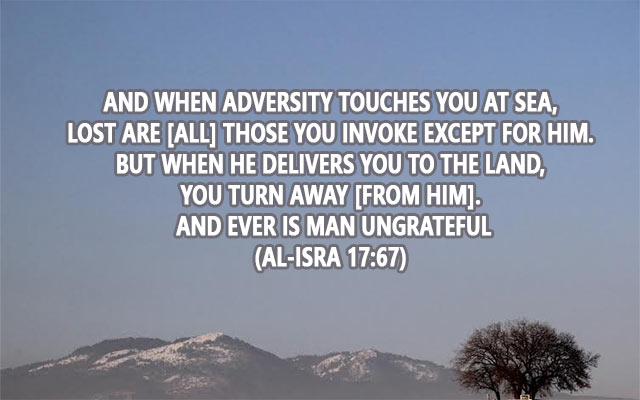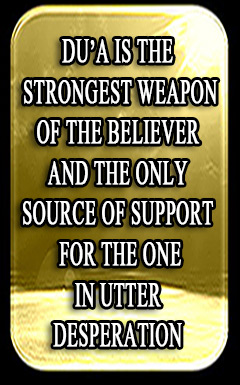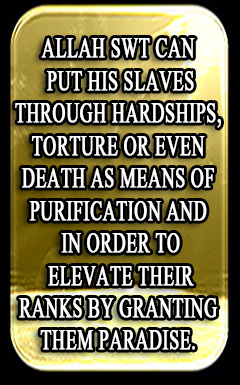|
||||||||||||||||||||||

|
||||||||||||||||||||||
|
|
||||||||||||||||||||||
|
|
 CONDITION OF THE UMMAHPART 14AINA AN-NAJAH—WHERE IS THE SAFETY? 
 Imagine yourself on a ship caught in a vicious storm in the high seas. The pounding waves and ferocious winds are rocking the ship so much so that each moment appears to be your last. Your ship has lost all sorts of communication with the outside world and you are off the radars. At this time of utter desperation and hopelessness the only thing you can do is to pray to be rescued. This rescue is called najah! If not that, then visualize yourself on an airplane whose engine begins to malfunction and the air craft needs to make an emergency landing. The cabin is shaking, the aircraft is plunging at a terrifying speed, the crew is panicked, the air pressure begins to plummet and the oxygen masks are dropped in front of you. You are told to put the life jackets on and be prepared for a rough landing. At this time of absolute helplessness and hopelessness, the only thing you can do is pray to reach safety and be rescued from this ordeal. This safety and rescue is what najah is! In another scenario, picture yourself in the middle of a desert. You are lost, with no food and water, have no means of survival and now you are doomed to die. At this time the only hope left for you is for someone to find you and rescue you. This is najah! These examples are all metaphors of our journey of life which is full of obstacles, conflicts, uncertainties, unknowns, calamities, illnesses, accidents, crises etc. This is especially true today when Islam and Muslims are being attacked from all fronts. There is a systematic spread of lies, confusion, and distortion of the message of Islam; and when this is combined with Muslims’ ignorance and misunderstandings of their deen, and their bad manners, it presents a destructive image of Islam and causes division within the Muslim Ummah as well as the larger society. This creates obstacles on the path of sincere people who are seeking guidance. We have a lot of challenges to overcome, both within us and outside, including the devils from the jinn and men. All of this is just a glimpse of dangers we are facing from which we need to be rescued and it cannot be done without the intervention of the only One who owns the rope of our safety.  WHY THE TERM NAJAH?
 Najah is an Arabic word which encompasses many meanings including to save, to rescue, to be delivered from, or to escape. This term has been used in the Qur’an over fifty times in different contexts. Depending on the situation, this rescue could be from a calamity, the shaytaan, from the enemy or even from one’s own nafs (base desires), but what remains the same is that the rescuer is always the Almighty, the Creator, the only One—Allah SWT.
Basically, He SWT is using the term najah to denote the magnitude of the situations we will face. These situations will be so intense, severe, and overwhelming that we will need desperate help and protection; and the only One who can offer this protection is Allah SWT! And with Him are the keys of the unseen; none knows them except Him. And He knows what is on the land and in the sea. Not a leaf falls but that He knows it. And no grain is there within the darknesses of the earth and no moist or dry [thing] but that it is [written] in a clear record. (Al-An’am 6:59)
We are in desperate need of the najah of Allah SWT and as we get closer to the Day of Judgment and the world plunges deeper into chaos and
tribulations, this need is only going to increase over time. The stronger our connection with Allah SWT is, the higher our chances will be of receivingnajah from Him. This is why it is of paramount importance to understand this topic and establish our relationship with the One who can give us najah both in this life and the next!
 SOME OF THE CONTEXTS ‘NAJAH’ IS USED IN THE QUR’AN
 And when adversity touches you at sea, lost are [all] those you invoke except for Him. But when He delivers you to the land, you turn away [from Him]. And ever is man ungrateful. (Al-Isra 17:67) In this verse Allah SWT is warning us of the forgetful and ingrate disposition of humans by saying that people usually sincerely turn to their Lord in their desperation but when He saves them and delivers them through their ordeal, they forget and go back to feeling independent and self-sufficient as if they do not need Allah SWT! Then one of the two women came to him walking with shyness. She said, "Indeed, my father invites you that he may reward you for having watered for us." So when he came to him and related to him the story, he said, "Fear not. You have escaped from the wrongdoing people." (Al Qasas 28:25) We would have invented against Allah a lie if we returned to your religion after Allah had saved us from it. And it is not for us to return to it except that Allah, our Lord, should will. Our Lord has encompassed all things in knowledge. Upon Allah we have relied. Our Lord, decide between us and our people in truth, and You are the best of those who give decision." (Al-A’raf 7:89) Allah SWT describes people asking for safety in one of the instances in the following words: It is He who enables you to travel on land and sea until, when you are in ships and they sail with them by a good wind and they rejoice therein, there comes a storm wind and the waves come upon them from everywhere and they assume that they are surrounded, supplicating Allah , sincere to Him in religion, "If You should save us from this, we will surely be among the thankful." (Yunus 10:22) And whoever is on earth entirely [so] then it could save him. (Al-Ma’arij 70:14) And when you have boarded the ship, you and those with you, then say, 'Praise to Allah who has saved us form the wrongdoing people.' (Al-Mu`minun 23:28) O you who have believed, shall I guide you to a transaction that will save you from a painful punishment? (As-Saff 61:10) In the above verse, Allah SWT is referring to the painful punishment of the grave. According to the tafseer of this verse, every person will taste this punishment except those who carry out the transaction that Allah SWT proposes following this verse. But the man who had been released, one of the two (who had been in prison) and who now thought of him after (so long), said: “I will tell you the truth of its interpretation, so send me forth.” (Yusuf 12:45) In this instance, Allah SWT uses the word‘najah’ for someone who was released or rescued from something very critical, in this case the jail and possible death sentence.  ASSURANCE FOR THE BELIEVERS
 Allah SWT repeatedly assures believers in the Qur’an that He saves His slaves. And when Our command came, We saved Hud and those who believed with him, by mercy from Us; and We saved them from a harsh punishment. (Hud 11:58) So when Our command came, We saved Salih and those who believed with him, by mercy from Us, and [saved them] from the disgrace of that day. Indeed, it is your Lord who is the Powerful, the Exalted in Might. (Hud 11:66) And when Our command came, We saved Shu'ayb and those who believed with him, by mercy from Us. And the shriek seized those who had wronged, and they became within their homes [corpses] fallen prone. (Hud 11:94) So We saved him and his family, all (Ash-Shu’ara 26:170) And We saved him and his family from the great affliction. (As-Saffat 37:76) [So mention] when We saved him and his family, all (As-Saffat 37:134) Indeed, We sent upon them a storm of stones, except the family of Lot - We saved them before dawn (Al Qamar 54:34) And We saved them and their people from the great affliction, (As-Saffat 37:115)  ALLAH SWT PROMISES HIS SUPPORT TO THE BELIEVERS
 Then We will save our messengers and those who have believed. Thus, it is an obligation upon Us that We save the believers (Yunus 10:103) In this verse, Allah SWT promises to rescue the believers stating that it is an obligation on the Most Merciful Lord to do so. But Allah SWT will save the believers when:
And We delivered him and Lot to the land which We had blessed for the worlds. (Al-Anbiya 21:71) And to Lot We gave judgment and knowledge, and We saved him from the city that was committing wicked deeds. Indeed, they were a people of evil, defiantly disobedient. (Al-Anbiya 21:74) And [mention] Noah, when he called [to Allah] before [that time], so We responded to him and saved him and his family from the great flood. (Al-Anbiya 21:76) So We saved him and those with him in the laden ship. (Ash-Shu’ara 26:119) But We saved him and the companions of the ship, and We made it a sign for the worlds. (Al-‘Ankabut 29:15)  THE PROMISE OF SUPPORT DOES NOT EXTEND TO DISBELIEVERS
 So We saved him and those with him by mercy from Us. And We eliminated those who denied Our signs, and they were not [at all] believers. (Al-A’raf 7:72) And they denied him, so We saved him and those with him in the ship and made them successors, and We drowned those who denied Our signs. Then see how was the end of those who were warned. (Yunus 10:73) [Abraham] said, "Indeed, within it is Lot." They said, "We are more knowing of who is within it. We will surely save him and his family, except his wife. She is to be of those who remain behind." (Al-‘Ankabut 29:32) [They continued] until, when the messengers despaired and were certain that they had been denied, there came to them Our victory, and whoever We willed was saved. And Our punishment cannot be repelled from the people who are criminals. (Yusuf 12:110) In some instances Allah SWT tells us how He rescued the believers with the Prophets, but not their own immediate families because of their disbelief. We see that in the case of Nuh (AS), Adam (AS) and, Lut (AS). The message is that this journey of faith is solitary where everyone must traverse their own path and no one can save anyone else without the permission of Allah SWT. Another lesson we learn is that the allegiance to faith and bonds created through it, are much stronger than the blood relations. Then We fulfilled for them the promise, and We saved them and whom We willed and destroyed the transgressors. (Al-Anbiya 21:9) So We saved him and his family, except for his wife; she was of those who remained [with the evildoers]. (Al-A’raf 7:83) So We saved him and his family, except for his wife; We destined her to be of those who remained behind. (An-Naml 27:57)  ALLAH SWT KNOWS WE ARE FORGETFUL
 Allah SWT reminds the people that they are forgetful by nature and tend to become ungrateful and even associate partners with Him after He SWT gives them what they had sincerely prayed for… And when they board a ship, they supplicate Allah, sincere to Him in religion. But when He delivers them to the land, at once they associate others with Him (Al-‘Ankabut 29:65) When a wave covers them like the canopy (of clouds), they call to Allah, offering Him sincere devotion. But when He has delivered them safely to land, there are among them those that halt between (right and wrong). But none reject Our signs except only a perfidious ungrateful (wretch)! (Luqman 31:32) In the above verse Allah SWT divides the rescued people into three categories:
In here, Allah SWT is warning people not to belong to the first two categories because in the end they will be destroyed and the only people who will receive real safety in the next life are those who belong to the third category—those who perform good deeds after they receive najah from Allah SWT. In the following verse, Allah SWT reminds people that only He SWT can save them from whatever befalls them, no one else can help them at all. Allah SWT then also reminds people to be watchful against ascribing partners with Allah SWT once He has delivered them from their difficulties. Say, "Who rescues you from the darknesses of the land and sea [when] you call upon Him imploring [aloud] and privately, 'If He should save us from this [crisis], we will surely be among the thankful.' " Say, "It is Allah who saves you from it and from every distress; then you [still] associate others with Him." (Al-An’am 6:63-64)  ALLAH’S SPECIAL MERCY ON THE BANI ISRAEL
 Children of Israel or the Jewish nation enjoyed special favors from Allah SWT. Allah SWT repeatedly sent Prophets to them for their guidance and saved them from many disastrous situations but they kept going back to disbelief and associating partners with Allah SWT until they lost their special standing in front of Allah SWT. Allah SWT tells us about saving them in many of their calamities… And We certainly saved the Children of Israel from the humiliating torment – (Ad-Dukhan 44:30) And [recall] when We saved your forefathers from the people of Pharaoh, who afflicted you with the worst torment, slaughtering your [newborn] sons and keeping your females alive. And in that was a great trial from your Lord. (Al-Baqarah 2:49) And We saved Moses and those with him, all together. (Ash-Shu’ara 26:65) And [recall] when We parted the sea for you and saved you and drowned the people of Pharaoh while you were looking on. (Baqara 2:50) And [recall, O Children of Israel], when We saved you from the people of Pharaoh, [who were] afflicting you with the worst torment - killing your sons and keeping your women alive. And in that was a great trial from your Lord. (Al-A’raf 7:141) O Children of Israel, We delivered you from your enemy, and We made an appointment with you at the right side of the mount, and We sent down to you manna and quails (Taha 20:80) Allah SWT saved the enemy of Bani Israel, Fir’awn’s body, as a warning against arrogance for humanity: So today We will save you in body that you may be to those who succeed you a sign. And indeed, many among the people, of Our signs, are heedless. (Yunus 10:92) The question arises, why does Allah SWT repeatedly tells us in the Qur’an about them and about what they did? Allah SWT gives us the examples of Bani Israel as a lesson for us. If we do what they did, we will receive what they received! If we disbelieve and think anyone other than Allah SWT can do anything for us, we will never receive His support. Instead we will get His SWT’s wrath and anger and will lose His favor just like the Children of Israel did.  SECRET OF SUCCESS
 The question arises that since rescuer is always Allah SWT who is closer to us than our carotid artery and who loves us even more than our mothers, why does He put us in difficulties and then waits for us to call on Him SWT?
When Allah SWT talks about the people in the ship who cried out to Allah SWT seeking his protection, He SWT said that they prayed to Allah “ sincere to Him in deen”! Du’a or prayer has been combined with the word ikhlaas (sincerity) in this verse. Therefore, the condition of acceptance of du’a is sincerity. Sincerity in what? Sincerity in our deen! Most Muslims believedeen to be worship such as prayer, fasts, pilgrimage etc. But this limited definition of deen would not make sense in this verse.Therefore, the word deen must mean something more than just worship. Deen actually means a person’s deep conviction and faith which governs his life. When a person is desperate, he will never call on anyone except on the one who he truly believes will come to his aid. He will call on the one he believes has the ability and the means to help him. Therefore, the acceptance of du’a depends on the sincerity and strength of the person’s faith!  ELEMENTS OF DU’A
 Du’a is the strongest weapon of the believer and the only source of support for the one in utter desperation. Du’a contains three major elements:
One of the constantly repeated messages in the Qur’an for all of us is that, when Allah SWT puts us in a desperate situation, He SWT wants us to call on Him only. We cannot have anything else in our heart—no panic, fear, hope, expectation, or anticipation from anyone! Unless we have 100% belief of Allah SWT in our heart, we cannot and should not expect 100% support from Him. The stories of the Prophets mentioned in the Qur’an are a reminder of Allah SWT’s power and support for His believers. However they also teach us that this support only comes once all the other means have been cut off and all other possibilities have been exhausted. Once the believers reached absolute helplessness and there is no one in their heart except Allah SWT, He SWT saves them.
The father of all Prophets Ibrahim (AS) reached this level of desperation many times and each time Allah SWT came to His aid at the very last minute. Ibrahim (AS) refused the help of even Angel Jibreel (AS) when he was thrown in the fire, because he did not want anyone except Allah SWT’s support. The same scenarios of total desperation, absolute reliance on Allah SWT and last minute interventions by Him SWT can be seen in the stories of Yunus (AS), Nuh (AS), Hud (AS), Lut (AS), Saleh (AS) and Shu'ayb (AS) . 1 All these stories emphasize one point: Allah SWT is the only one who can save us!  THOSE WHO RECEIVE NAJAH
 There are certain people with certain qualities who receive the protection and safety from Allah SWT. These qualities and characteristics should be implemented like a constitution. And when they forgot that by which they had been reminded, We saved those who had forbidden evil and seized those who wronged, with a wretched punishment, because they were defiantly disobeying. (Al-A’raf 7:165) So why were there not among the generations before you those of enduring discrimination forbidding corruption on earth - except a few of those We saved from among them? But those who wronged pursued what luxury they were given therein, and they were criminals. (Hud 11:116) And We saved those who believed and used to fear Allah. (An-Naml 27:53) And We saved those who believed and used to fear Allah. (Fussilat 41:18) So We responded to him and saved him from the distress. And thus do We save the believers. (Al-Anbiya 21:88) Those who have taqwa (awe and fear of Allah SWT) will be protected from all harm and will be saved by Allah SWT: And Allah will save those who feared Him by their attainment; no evil will touch them, nor will they grieve. (Az-Zumar 39:61) Qualities that guarantee the protection and safety from Allah SWT:
We have to re-establish our faith in Allah SWT and return to Him wholeheartedly. We have to cut off all other means, hopes, expectations, notions, ideologies, and understandings from our hearts and minds and go back to the pure teachings of Islam as taught by the Prophet SAW. Once we have purity of faith and unshakable trust in Allah SWT, Allah will come to our rescue and save us when we are alone and no one is on our side. 100% reliance from the slave, guarantees 100% support from the Master! However, this faith is manifested through certain qualities in the believers. When the turmoil and confusion (fitna) spreads, Allah SWT will save those who have the following characteristics:
O you who have believed, shall I guide you to a transaction that will save you from a painful punishment? [It is that] you believe in Allah and His Messenger and strive in the cause of Allah with your wealth and your lives. That is best for you, if you should know. (As-Saff 61:10-11)  NAJAH—DUNIYA & AKHIRAH
 We need to make a distinction between the transient life of this world and the everlasting life of the hereafter. Allah SWT trials some people or some nations with severe calamities and it might appear to us that there is no najah coming to them from Allah SWT. That is because we have peripheral vision and do not know the deep wisdom of Allah SWT behind every situation. Yes, some people might be going through intense trials, including destruction, injuries and widespread killing but all these trials might actually be causing them to get closer to Allah SWT and rely on Him more. In this case these trials become a source of najah for them in their hereafter. On the other hand, those who watch others suffer and do not do anything to alleviate their distress; they might have najah in this world but their afterlife becomes endangered.
From all the stories mentioned in the Qur’an we can extract one main concept: Allah SWT can put His slaves through hardships, torture or even death as means of purification and in order to elevate their ranks by granting them paradise. Rasul Allah SAW said: “This nation of mine is one upon which there is mercy; there is no punishment upon it in the Hereafter; its punishment is in this world—with trials, earthquakes, and killings.” (Abu Dawud) Then We will save those who feared Allah and leave the wrongdoers within it, on their knees. (Maryam 19:72) We can conclude that in all the verses mentioned above, Allah SWT is recapping only one major issue: every problem in life—whether it is personal, familial, societal, national, medical, marriage issue, FINANCIAL situation—no matter what the condition is, the only one who can assist us, save us and guide us is Allah SWT. Once we realize this, He SWT promises to rescue us, save us, guard us, and guide us to the road of safety. Once we have internalized this understanding, Allah SWT will help us navigate our way through this life to the bridge of safety at the time of death, safety from torture of the grave, and safety on the Day we will need it most until we reach the land of safety and peace, paradise of Allah SWT. Note: To understand this topic further, please read the article series ‘Journey of Victory vs. Journey of Defeat’ on www.noora1.com.  WE ARE DESPERATE FOR ALLAH’S SAFETY
 Muslims and Non-Muslims alike are waiting to be rescued—from the uncertainty of the future, from the unknown, from emptiness of the heart and soul, from instability of the faith, and the list goes on. This need to be rescued is shared by many people among all walks of life, but especially the youth of our times. The current climate of hostility against anyone seeking faith and guidance has left them overwhelmed as if they have been thrown in the ocean without any direction, plan, or means to go anywhere. They are helplessly waiting for the right wave to take them to safety, to their Blue Lagoon. This wave that can save us from drowning and can deliver us to safety is the wave of faith and guidance and it can only come from the Almighty, the Creator Allah SWT alone, no one else. Allah SWT is the only one who can take us from the darkness of unknown and confusion to the light of safety. How can we be rescued from this madness? The most crucial survival mechanism at such times is the right knowledge. The knowledge of how to peacefully navigate through life until we reach the hereafter. We need to find the rope and the source of rescue and then hold on to it until we reach to safety. We need najah from:
 CALLING ON ALLAH SWT
 Our Merciful Lord Allah SWT and His beloved Messenger SAW have given us a complete system of life. This not only includes what to protect ourselves from but also how to do it. Below are a few examples of the believers calling on Allah SWT for safety and protection. Notice the conviction and etiquettes displayed in these calls… And save us by Your mercy from the disbelieving people." (Yunus 10:86) The following verse is a beautiful, comprehensive du’a: Then judge between me and them with decisive judgment and save me and those with me of the believers." (Ash-Shu'ara 26:118) My Lord, save me and my family from [the consequence of] what they do." (Ash-Shu'ara 26:169) So he left it, fearful and anticipating [apprehension]. He said, "My Lord, save me from the wrongdoing people." (Al-Qasas 28:21) Look at the du’a of Asiya (AS) who, while being severely persecuted, asked Allah SWT to build her a house near Him in jannah and to save her from Pharaoh: And Allah presents an example of those who believed: the wife of Pharaoh, when she said, "My Lord, build for me near You a house in Paradise and save me from Pharaoh and his deeds and save me from the wrongdoing people." (At-Tahrim 66:11) Rasul Allah SAW has encouraged us to make the du’a of Yunus (AS) saying. “The supplication of Dhun-Nun (Prophet Yunus) when he supplicated, while in the belly of the whale was: ‘There is none worthy of worship except You, Glory to You, Indeed, I have been of the transgressors. (La Ilaha Illa Anta Subhanaka Inni Kuntu Minaz-Zalimin)’ So indeed, no Muslim man supplicated with it for anything, ever, except Allah responds to him.” (Tirmidhi) We need to seek Allah SWT’s protection and seek safety and refuge with Him as taught by the Prophet SAW: Allahumma inni as`asluka al ‘afw wal ‘aafia wal mu’aafat at taam-ma fid deeni wad duniya wal akhirah. “Oh Allah, I seek refuge in Your forgiveness and your protection in my religion, in this world and the next.” Our beloved Prophet SAW used to also beseech Allah SWT in the following words: Ya Hayy Ya Qayyum bi rahmatika astagheeth aslah lee sha`ni kullahu wala takilni ila nafsee tarfata ‘ayn. “O the Ever Living (Al Hayy), the Self-Subsisting (Al-Qayyum)! By Your Mercy rectify my every affair, and do not leave me to myself even for the blink of an eye. {Meaning, do not make me rely on myself, even for a moment.} (Al-Hakim) Note: Please listen to the lecture series titled “The Most Beautiful Names of Allah Intro” on www.noora1.com.  WHAT IS MISSING?
 It is true that we are in a precarious situation as an ummah. All the odds are stacked against us from our ignorance of our deen to the conspiracies against Islam. What is the difference between our condition and the condition of Musa (AS) when he was trapped between the enemy on one side and the sea on the other? Nothing! Allah SWT split the sea for Musa (AS) because he believed. Our Lord is the Lord of Musa (AS). If He opened for him, why would He not open for us? He will open for us if we have the concrete iman in Him SWT! This is what we are missing today. We need the reality of iman in our hearts; the kind of iman that when we raise our hands for du’a, the throne of Allah SWT shakes and He SWT grants us what we are asking for! The reality of iman is our only hope for safety! If we want safety, we have no choice but … “So hasten you then (at once) to Allah…” (Adh-Dhariyat 51:50) 1
Listen to the lecture series “The Life of Messengers and Prophets” on www.noora1.com to understand this topic in depth.
 If You Liked This Article, Please Download it, Print it, and Share it: Just 'Right-Click' on the button of your choice and choose 'save target as'
|
|||||||||||||||||||||















